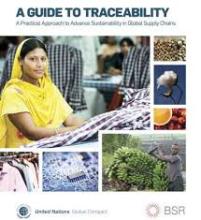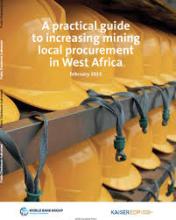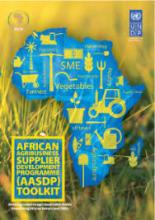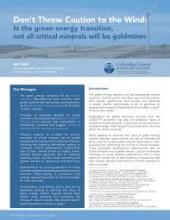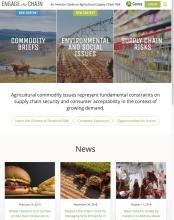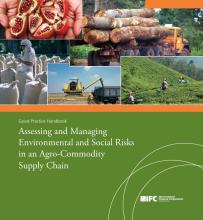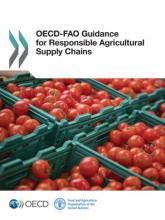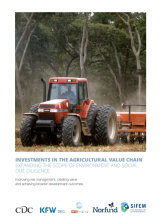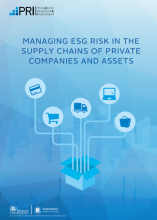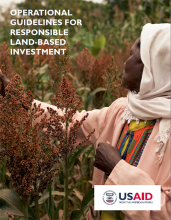Resources for Responsible supply chains
A guide to traceability: A practical approach to advance sustainability in global supply chains
This guide provides companies with an overview of the importance of traceability for sustainability purposes, outlines the global opportunities and challenges it represents and summarises practical steps for implementing traceability programmes within company operations. It
• defines traceability and explores its history, benefits and challenges, including an overview of current collaborative schemes on traceability,
• demonstrates a model for best practice in traceability, and provides an overview of the different models of traceability and the global initiatives operating in the arena, and
• provides guidance to companies around the world, large and small, on how to effectively engage in traceability.
A practical guide to increasing mining local procurement in West Africa
This document provides information, guidance and tools to support decision-making, planning and implementation of mining local procurement, in particular at a country level. It can be used by individual role players as well as form the basis of consultative processes. The guide can also support regional harmonization relating to mining local procurement. Although based on West Africa, it will be a useful resource in other regions.
African Agribusiness Supplier Development Programme (AASDP) Toolkit - Growing inclusive agri-food value chains benefitting African famers and SMEs
This resource provides tools for companies and buyers to improve responsibility and due diligence along the commodity supply chain, building on the Agribusiness Supplier Development Programme (ASDP). It
• provides a brief introduction of the issues,
• provides an in-depth background on the African agricultural economy and the position of smallholders suppliers, SMEs and business in this,
• lays out an overview of the programme’s phases and activities, its governance model, the roles and responsibilities of the various actors within a supply chain, as well as budget and finance, and the setup of a Monitoring and Evaluation (M&E) system, plus an exit strategy,
• provides a range of applied tools and methodologies for implementing the six phases of an ASDP, M&E and impact measurement.
Don't Throw Caution to the Wind: In the green energy transition, not all critical minerals will be goldmines
This note proves recommendations for governments, international actors, and mining advocates who seek to optimize the value of green energy mineral reserves, to ensure that expectations for green energy materials do not replace careful planning, impact assessment, and allocation of risks, as well as prevent over-production.
Engage the Chain: An Investor Guide on Agricultural Supply Chain Risk
This interactive guide discusses the environmental and social risks and impacts associated with a number of agricultural commodities, which are among the most prominent drivers of deforestation, greenhouse gas emissions and water depletion and pollution.It clarifies actions investors and companies should take to reduce agricultural supply chain risks and exposure. It also contains additional resources, such as downloadeable guides.
Good Practice Handbook: Assessing and Managing Environmental and Social Risks in an Agro-Commodity Supply Chain
This handbook is intended for agro-commodity companies that want to better manage supply chain environmental and social risks. The Handbook focuses on five major agro-commodity supply chains—palm oil, soy, sugarcane, cocoa, and coffee—but many of the tools, resources, and case studies can be used as guidance for other agro-commodities.
Guidance for Responsible Agricultural Supply Chains
This guide aims to help enterprises observe standards of responsible business conduct and undertake due diligence along agricultural supply chains in order to ensure that their operations contribute to sustainable development. It provides information on
• a model enterprise policy outlining the standards that enterprises should observe to build responsible agricultural supply chains,
• a framework for risk-based due diligence describing the five steps that enterprises should follow to identify, assess, mitigate and account for how they address the adverse impacts of their activities,
• description of the major risks faced by enterprises and the measures to mitigate these risks, and
• Guidance for engaging with indigenous peoples.
Investments in the Agricultural Value Chain: Expanding the Scope of Environment and Social Due Diligence - Improving Risk management, Creating Value and Achieving Broader Development Outcomes
This report provides guidance for development finance institutions and investors seeking to understand and manage environmental and social issues responsibly at different stages of the value chain. It provides
• information on ways investors can expand the scope of due diligence to further improve E&S risk management and drive value through supply chains,
• initial and practical information about the links between upstream and downstream actors in the value chain, including primary producers and project-affected communities, and
• a more integrated approach to E&S risk management, value creation and development.
Managing ESG Risk In The Supply Chains Of Private Companies and Assets
This guide is primarily intended for private equity and real asset investors seeking to improve the risk profile of their portfolios and maximise their returns by investing in companies that manage their supply chains effectively. It provides information on what to look for and on how to engage with companies on E&S risks in supply chains.
Operational Guidelines for Responsible Land-Based Investment
This guide discusses USAID’s recommendations for best practices related to the due diligence and structuring of land-based investments, with the goal of reducing risks and facilitating responsible projects that benefit both the private sector and local communities. It is designed to help companies identify practical steps to align their policies and actions with international policy consensus on land governance and land rights.


